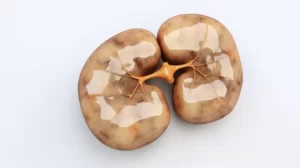Carrying excess weight not only impacts your overall health, but it can also lead to serious kidney complications, especially among women. This article will focus on the growing problem of kidney stones and how the rise in obesity rates, particularly amongst women, plays a significant part.
What Are Kidney Stones?
Kidney stones form when the urine contains too much of certain substances, such as calcium, oxalate, and uric acid, that crystalize and form hard stones in the kidney. These stones can further lead to infection, sepsis or blockage of the urinary tract, causing immense pain and discomfort while passing through if not addressed promptly.
Weight Gain and Kidney Stones in Women
A study conducted at the Henry Ford Hospital in Detroit revealed that the number of women experiencing kidney stone complications is on the rise. The study’s lead researcher, Dr. Khurshid R. Ghani, noted that “women are becoming more and more obese. Obesity is a major risk factor for developing a kidney stone. And one fascinating thing about women versus men is obese women are more likely to develop a stone than an obese man.”
The increase in kidney stone cases is putting a strain on the healthcare system in the United States. The current amount paid concerning the emergency department visits attributed to kidney stones amounts to over $5 billion annually.
The Role of CT Scans
One possible reason for the increased expenditures is the usage of CT scans to diagnose kidney stones. Around 15 years ago, only about 5-10% of kidney stone patients in an emergency department would receive a CT scan. However, today that number has jumped to around 70%. While these scans are an excellent and accurate tool for diagnosis, they come with a high price tag.
Preventing Kidney Stones Through Weight Management
One of the most effective ways to decrease the risk of developing kidney stones is to maintain a healthy weight. A balanced diet and regular exercise can help in weight management and can contribute to reducing the risk of kidney stone formation.
Stay Hydrated
Drinking enough water daily is essential as it helps to dilute the substances in the urine that can cause kidney stones. Experts recommend drinking approximately eight 8-ounce glasses, or 2 liters, of water daily to maintain good health and decrease the risk of stone formation.
Avoid Excess Salt
A high sodium diet can increase the risk of developing kidney stones. Reducing your salt intake by reading food labels, choosing low sodium options, and not adding extra salt to your meals can help mitigate that risk.
Limit Animal Protein
Consuming too much animal protein, such as red meat, poultry, eggs, and seafood, can increase the risk of kidney stones. Limiting your intake of these foods and including more plant-based proteins in your diet can help prevent the formation of stones.
Calcium-Rich Foods
Although kidney stones are primarily made of calcium, consuming calcium-rich foods can actually help decrease the risk of stone formation. This is because calcium binds with oxalate in the gut, reducing the amount that reaches the kidney and the chance it will crystalize in urine. Include a variety of calcium-rich foods in your diet, like dairy products, almonds, broccoli, and kale.
Conclusion
The rising rate of obesity, particularly among women, is resulting in increased cases of kidney stone complications and putting a strain on the healthcare system. By maintaining a healthy weight, staying hydrated, and eating a balanced diet with limited salt and animal protein, women can significantly reduce their risk of developing kidney stones and improve their overall health.



